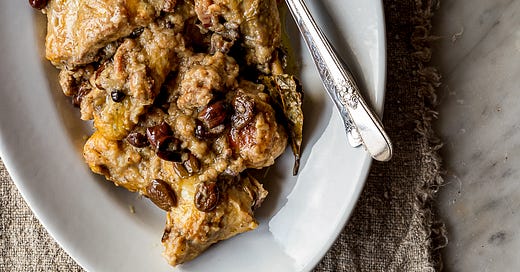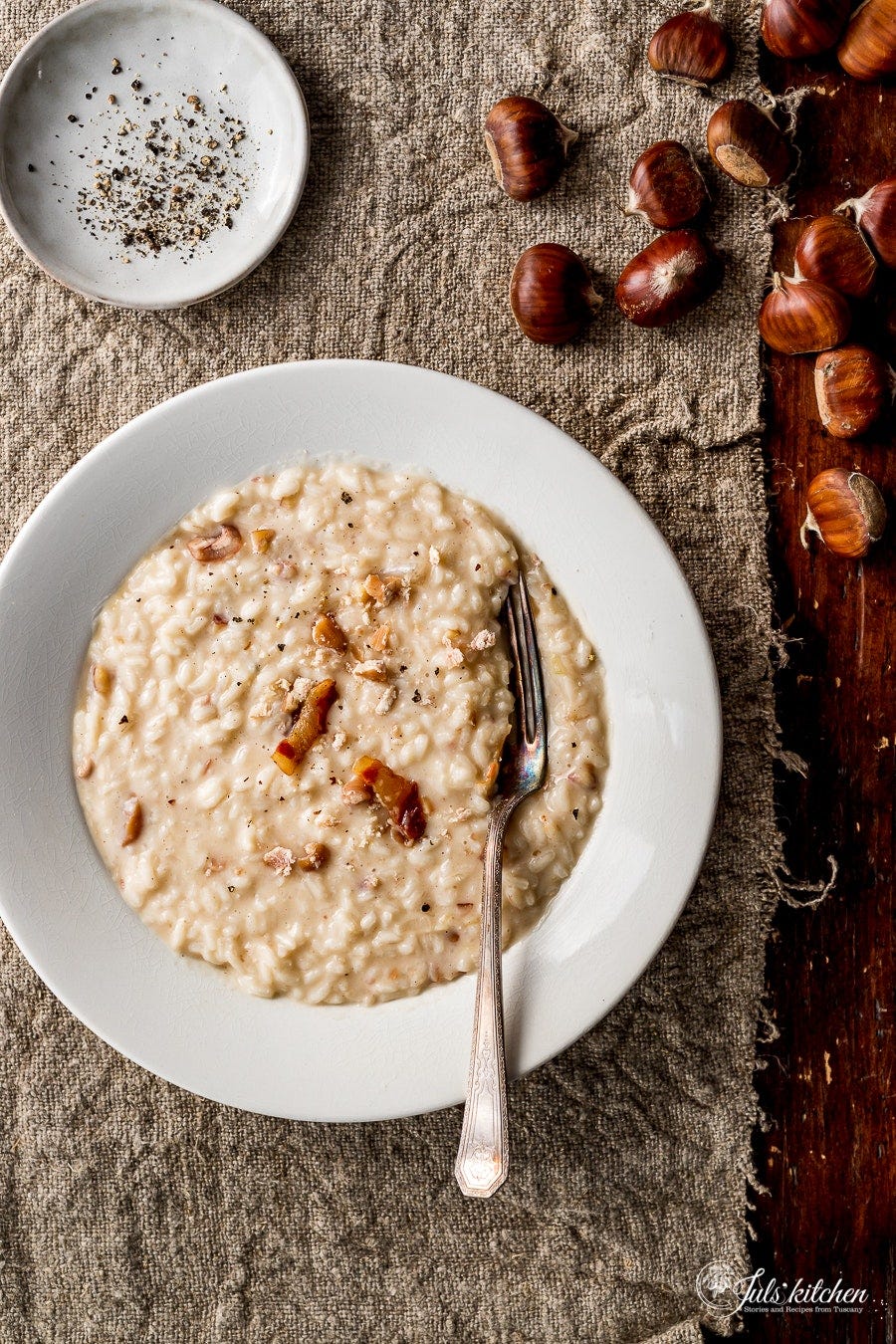The moments when I’ve felt safer in my life are at the table, with my large family gathered around a simple fare. At the table, I’m a mother, a daughter, a sister, a granddaughter, I’m a wife, stealing a perfectly roasted potato from Tommaso’s plate; I’m my Aunt’s niece when she serves me an extra portion of her lasagne; I’m an aunt, too, when my niece wants to sit just next to me, whispering in my ear all her secrets. I have a role, I have meaningful connections, I have a safety net.
Call it a cliché, but I’m Italian, and I love conviviality, I love rituals and all the family habits that involve food and seasonality. This is probably one of the reasons why I can’t wait for big holidays to come.
I am always keen on adopting new traditions to add a sense of time, a reason to celebrate and cook something that has a deeper meaning for us as a family.
That’s why I’ve been baking a British Christmas cake for 10 years now. First, I tried Jamie Oliver’s recipe – the one you can find in one of the most commented posts on this blog – then Nigel Slater’s recipe from The Christmas Chronicles, and eventually my friend Regula Ysewijn’s fruit cake, the one she had for her wedding, as she shared it in her cookbook Oats in the North, Wheat from the South. I tried it out of curiosity, then adopted it for the ritual of baking it when Christmas is still out of sight, feeding it with brandy through the weeks that slowly lead us to the holidays.
When I met Tommaso, his Apulian traditions crept into my way of celebrating.
I started making pittule on the eves of important holidays: after all, do you need an excuse to fry pillowy bread dough morsels studded with olives, tomatoes, capers, and anchovies? I’m also slowly adding new family rituals belonging to Salento as a way to remember Lucia, his mum, who passed away last year. I made it my mission: it is my way to get to know her better through the flavours and the traditions of her homeland, and a way to pass all these memories on to Livia.
I have never celebrated Thanksgiving in America, but from what I gathered from movies, books, and all the exchanges we had over a large, relaxed meal during our cooking classes, it would be right up my alley. It is probably the conviviality I would appreciate more, the family traditions, the long wait to eat your Aunt’s favourite dish, or the quirkiness of that family habit that happens again and again over the years.
And so, for the upcoming Christmas, but also for Thanksgiving, I want to put aside the sense of inadequacy, the stress of wanting to impress at all costs, the cooking marathons and the crazy shopping, the exasperation of being – or appearing – perfect, on Instagram and in real life. Instead, I just want to make room for conviviality.
Conviviality, for me, is all about sharing small rituals, building habits, cooking to nurture, not to impress.
There’s nothing better than when conviviality marries simplicity, so don’t stress over the menu. Whether you’ll be sitting around a long table or just with your other half, I can help you with some simple, reliable recipes, coming directly from my family cooking repertoire.
What is conviviality for you?
Before jumping to the recipe, we created a special 25% discount for Black Friday to subscribe to our Monday newsletter where you will receive exclusive recipes, ingredient insights, travel tips, Q&A, discussion threads, and much more. The discount is valid until Sunday, the 28th.
Faraona in salmì – Stewed Guinea fowl
Recipe developed in collaboration with Cecchi.
The wine we chose for today’s recipe is Valore di Famiglia, a Chianti Classico Gran Selezione D.O.C.G. produced in Castellina in Chianti. With a soft ruby red colour, very delicate, it has a velvety start that develops in a wide envelopment. It is a perfect wine for a roast, game and aged cheese.
We thought about faraona in salmì, stewed guinea fowl, a dish that for us has a strong sense of family, of festive days worth celebrating, a recipe whose aromas are very close to game meat, but that is at the same time accessible and easy to make.
Get the recipe for the stewed Guinea fowl on the blog.
If you decide to participate in the weekend cooking project, share the results with us on social media by using the hashtag #myseasonaltable and tagging @julskitchen on Instagram.
If you have questions about the ingredients or the recipe, if you have a special request for one of the following cooking projects, or want to have a chat, reply to this email.
8 recipes to celebrate conviviality
I’m also sharing a small selection of my favourite recipes that are made for conviviality: big pots of ragù, both with beef and with lentils, wild boar stews, trays of crespelle, a turkey roast, and a few seasonal cakes. I hope you will enjoy them.
Tuscan ragù. How many meat sauces exist in Italy? In between the rich and self-indulgent Bolognese ragù, where the ground beef and the ground pork are cooked with white wine, milk and tomato paste, and the Neapolitan one, where tradition has it that there is no ground meat, but whole pieces of meat that must be cooked slowly in a rich tomato sauce, there is a glimpse of irreverence and local rivalry, of anarchy and tradition, where the Tuscan ragù is slowly simmered at home.
Lentil ragù. The ragù, just like the tomato sauce, gets better if cooked in large quantities, in pots that look like tubs, with someone in your mind, so as to distil your thoughts and stir them with the olive oil and the vegetables, making a deliciously invaluable sauce.
Crespelle alla Fiorentina. It is a handy recipe to learn, as you can vary the filling according to the season. Asparagus, artichokes and butternut squash are some of my favourites along with spinach and Swiss chard. You can mix the vegetables with fresh milky ricotta or add some béchamel into the filling. Cheese is a welcomed ingredient: Parmigiano Reggiano, Tuscan or Roman Pecorino, ricotta salata, or any other savoury aged cheese that you would happily grate over your pasta.
Stuffed turkey breast. One of the recipes that my mum taught me and that I immediately associate with Sunday lunches is the stuffed turkey breast, roasted on the stovetop and not in the oven. It is a humble dish, but it has enormous potential.
Stewed wild boar. Marinade the wild boar with herbs, vegetables and wine overnight and do not forget bay leaves and juniper, which beautifully marry the gamey meat. Bring the wild boar to room temperature before cooking it, a small expedient which is always of use when it comes to cooking meat.
Fennel gratin. If your main course is pork-based, though, choose fennel as a side dish. You can prepare a Mediterranean salad, with thinly sliced fennels, segments of blood oranges and black olives, or prepare a gratin, with lots of garlic and lemon.
Tiramisu cake. It is a celebratory cake, a tiramisu cake. Tiramisu is one of my favourite desserts ever: it is creamy, with the right flavour balance given by the dark coffee and the sweet mascarpone cream. Now it becomes a tiramisu layered cake, where the bitter flavour of coffee meets a moist chocolate cake and a creamy mascarpone filling.
Blueberry jam and ricotta crostata. The shortcrust is rustic, as it features not only plain wheat flour but also whole buckwheat flour, something which typically appears in cakes and pies baked in the mountains, filled with wild berries.
Are you interested in more exclusive recipes?
The past two years broke habits and dreams, put a stop to conviviality, visits to small family-owned restaurants to learn recipes passed down from generations. Through our chats and messages, you told us that what you missed more was the conviviality of crowded tables, the inspiration you could get from a trip to a small market where apparently everyone knew each other.
When we first launched our subscription-based newsletter back in March, we thought it was mainly about sharing recipes. We could not believe it could become for you an anchor to Italy, to the Italian table and our loud conviviality, a reason to experiment with less known ingredients, the voice of a friend in the kitchen.
What you missed recently: Chestnut risotto, Saltimbocca alla romana, Focaccine with taleggio and mushrooms, Crostata di frutta fresca, Caprese cake, Chestnut flour tagliatelle with porcini and sausages.
If you join us, you will receive a new exclusive recipe inspired by ingredients, season, or tradition every week. You will discover Italian classics, weeknight ideas with an Italian flair, reliable dishes to add to your cooking repertoire. You’ll share a glimpse of our daily life in Tuscany through food.
Subscribing to the newsletter, you will support us directly. Whenever you decide to join us, you will have complete access to the whole archive of already published recipes and stories.
We love Letters From Tuscany as it is like having our own independent publication: we test, photograph, write each recipe just for you. It is a way of sharing great content, recipes that we like, created to inspire you, to bring a little taste of Italy to your kitchen, for you and your family.









My late beloved mother taught conviviality to us. Holidays were made special not because we had a lot of money but because of traditions. Each holiday was presented with special foods. Easter was Pizza Rustica, ravioli, and ham; Thanksgiving was Italian Wedding Soup, Lasagne, Turkey & all the trimmings; Christmas was Pasta and Pork Roast or Turkey. There always was antipasti to start, lots of desserts and 'FAMILY'. She made every holiday special and we all looked forward to being together, eating good food, and playing games. We miss her very much, but she lives on in our hearts and in the traditions we observe.
Congratulations on the new subscription I am super excited!
I love the idea and I didn't know it had a name! I enjoy cooking and especially cooking with my daughter ( who now teaches cooking at high school) and also teaching my granddaughters (10 & 6) I love preparing and cooking food for my husband and friends and family. They all know my favourite cuisine is Italian, I am an Aussie and I am sure somewhere I have Italian heritage. I have a question for you Giulia, can I substitute the Guinea fowl with a organic free range chicken or do I need duck? I am not sure if I can get a guinea fowl where I live. Lisa-Maree Albany Western Australia.